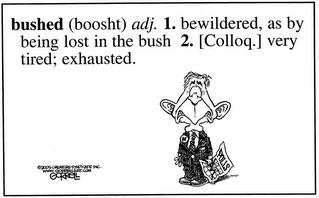It's All Your Fault

It's can't be fun being George Bush these days. He's definitely been consigned to lame duckism status. He has to deal with a Democratic Congress. Everywhere he turns, there is yet another disaster to deal with.
Thank god he doesn't read the paper or his normal bad day would be worse after reading that even his friends have turned against him. In Embittered Insiders Turn Against Bush, the Washington Post notes:
Not that I feel sorry for him, since he allowed this to happen through a combination of his own hubris, ego, and insecurities. In other words, he began to believe his own bullshit. Big mistake and now he and the rest of us are paying for his mistakes. And unfortunately, we will be paying for a long time -- long after he is gone.A certain weary crankiness sets in with any administration after six years. By this point in Bill Clinton's tenure, bitter Democrats were competing to denounce his behavior with an intern even as they were trying to fight off his impeachment. Ronald Reagan was deep in the throes of the Iran-contra scandal. But Bush's strained relations with erstwhile friends and allies take on an extra edge of bitterness amid the dashed hopes of the Iraq venture.
"There are a lot of lives that are lost," Adelman said in an interview last week. "A country's at stake. A region's at stake. This is a gigantic situation. . . . This didn't have to be managed this bad. It's just awful."
The sense of Bush abandonment accelerated during the final weeks of the campaign with the publication of a former aide's book accusing the White House of moral hypocrisy and with Vanity Fair quoting Adelman, Richard N. Perle and other neoconservatives assailing White House leadership of the war.
Since the Nov. 7 elections, Republicans have pinned their woes on the president.
* * * *
The arc of Bush's second term has shown that the most powerful criticism originates from the inside. The pragmatist crowd around Colin L. Powell began speaking out nearly two years ago after he was eased out as secretary of state. Powell lieutenants such as Haass, Richard L. Armitage, Carl W. Ford Jr. and Lawrence B. Wilkerson took public the policy debates they lost on the inside. Many who worked in Iraq returned deeply upset and wrote books such as "Squandered Victory" (Larry Diamond) and "Losing Iraq" (David L. Phillips). Military and CIA officials unloaded after leaving government, culminating in the "generals' revolt" last spring when retired flag officers called for Rumsfeld's dismissal.
On the domestic side, Bush allies in Congress, interest groups and the conservative media broke their solidarity with the White House out of irritation over a number of issues, including federal spending, illegal immigration, the Supreme Court nomination of Harriet Miers, the response to Hurricane Katrina and the Dubai Ports World deal.
Most striking lately, though, has been the criticism from neoconservatives who provided the intellectual framework for Bush's presidency. . . . Others close to the White House said the neoconservatives are dealing with their own sense of guilt over how events have turned out and are eager to blame Bush to avoid their own culpability.

No comments:
Post a Comment